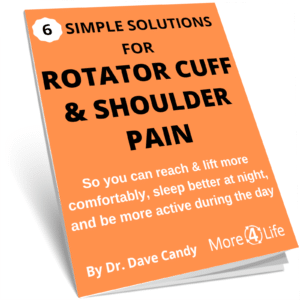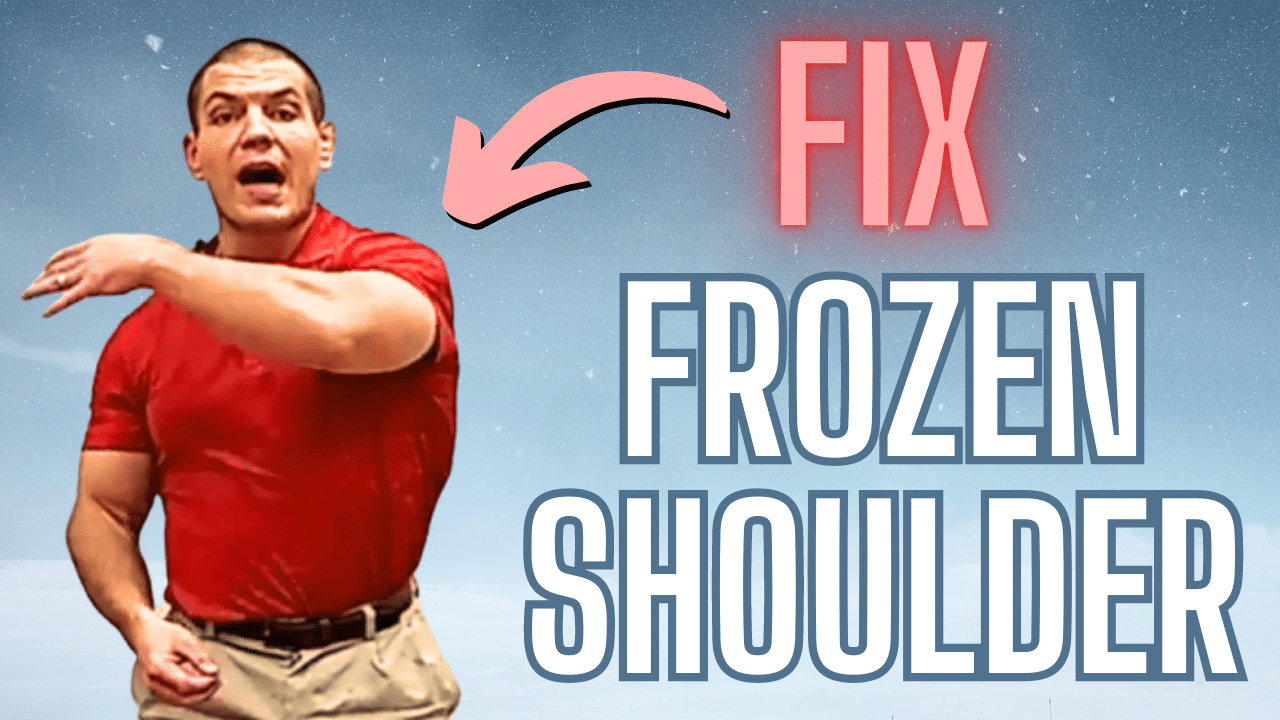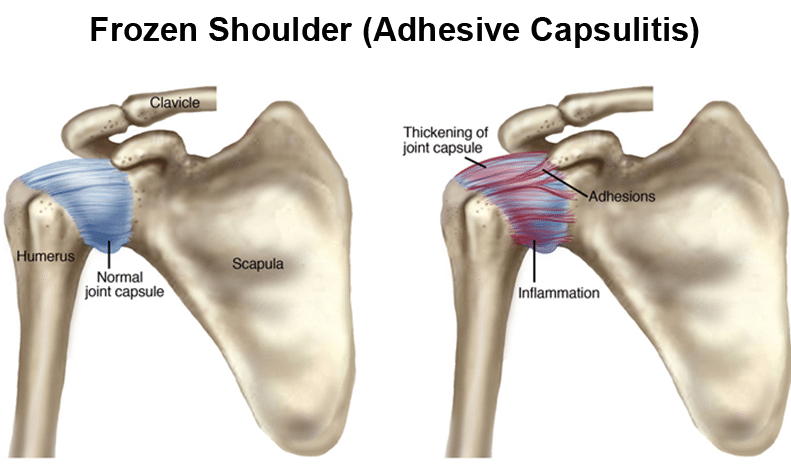What Causes Frozen Shoulder & What Exercises Can Help?
Watch the video below to learn what causes a frozen shoulder (it might NOT be adhesive capsulitis) plus some exercises and other treatments that you may not have thought of

Frozen Shoulder Causes
Most people who suffer from a frozen shoulder can't think of a distinctive cause or injury.
Frozen shoulder most commonly occurs in women in their 40's to 60's (around menopause age). Frozen shoulder is about 4 times more common in women than in men.
It's also MUCH more common in diabetics than in people without diabetes.
The term "frozen shoulder" is typically used interchangeably with the medical condition called "adhesive capsulitis", but I'd argue that they're NOT the same thing.
Adhesive capsulitis is a subgroup of frozen shoulder. That is to say, all people with adhesive capsulitis have a frozen shoulder, but not all people with a frozen shoulder have adhesive capsulitis.
Frozen Shoulder Symptoms
At the most basic level, frozen shoulder symptoms are pain and lack of movement.
Many things can cause a stiff, painful shoulder that doesn't move:
Frozen Shoulder Versus Rotator Cuff
Although rotator cuff symptoms can be similar to a frozen shoulder, they're different problems.
A rotator cuff problem is a muscle injury ranging from tendinitis to a tear. Usually the symptom include limited and painful active movement when you use your own muscles to move your shoulder, but usually if someone else moves your shoulder passively, without you having to use your rotator cuff muscles, your shoulder usually moves well, and without too much pain. You may also have weakness with a rotator cuff tear.
Contrarily, with a frozen shoulder, usually shoulder strength is pretty good, but the shoulder is stiff and painful with both active and passive movement.
A rotator cuff problem that goes without treatment too long can ultimately become a frozen shoulder though if the joint and muscles around it get too stiff.
What is Adhesive Capsulitis?
Adhesive capsulitis is another condition that can cause symptoms of a stiff, painful shoulder.
With adhesive capsulitis, the joint capsule around the shoulder gets inflamed and then scars down restricting shoulder movement.
Adhesive capsulitis can develop after an injury such as a rotator cuff tear or shoulder dislocation, or after a rotator cuff surgery.
Adhesive capsulitis can also start on it's own without an obvious reason. Onset of symptoms is most common in women in the peri-menopausal years (age 40-65) and particularly if they have diabetes.
If the inflamed shoulder becomes painful, the capsule around the shoulder can develop scar tissue and become thicker, thus causing a "frozen shoulder"
Frozen Shoulder Causes BESIDES adhesive capsulitis can include:
-
A C5 radiculopathy from a herniated or degenerative disc
- An irritation of the brachial plexus (nerve bundle between the neck and shoulder)
Undiagnosed Neuropathies Can Be a Cause Of Frozen Shoulder
Thinking of the people who develop frozen shoulder most often - diabetics, women around menopause age, and people with thyroid dysfunction - this is the same population that is likely to develop peripheral neuropathies.
Frozen Shoulder From Diabetes
The precise reason for the link between frozen shoulder and diabetes is not known, but diabetes makes women 5 times more likely to develop frozen shoulder (and men 5.9 times more likely).
Again, long-term uncontrolled blood sugar damages nerves causing neuropathy, and from my past experience working with people with frozen shoulders, I think this neuropathic component of frozen shoulder is far under-recognized.
Frozen Shoulder And Menopause
The hormonal changes that occur as estrogen levels decline during menopause can be a trigger for a frozen shoulder.
Essentially it's a change in the body's chemical make-up that the nervous system has to respond to.
Pain is essentially a warning signal that "there's something that might be wrong, and you need to do something about it". It's a warning that the "status quo" has changed. Which is exactly what happens during menopause.
Menopause alone isn't enough to cause frozen shoulder. After all, not every woman that goes through menopause gets a frozen shoulder.
But it's one other "risk factor" and when added to other factors such as diabetes, thyroid disorder, and other physical issues such as shoulder or neck injuries, it increases the likelihood of developing frozen shoulder.
Frozen Shoulder And Thyroid Disorders
Long-term underactive thyroid can cause fluid retention, which can put pressure on nerves causing neuropathy. It is known that women with hypothyroidism are 7.3 times more likely to develop a frozen shoulder. Women also commonly start to demonstrate symptoms of an underactive thyroid with the hormonal changes that occur with menopause.
Need Treatment For Frozen Shoulder?
Click the button below to request a Free Consultation with our specialist
Frozen Shoulder 4 Stages
Frozen Shoulder goes through 4 stages:
- Pre-Freezing - symptoms usually present as some other type of shoulder problem, such as a rotator cuff disorder
- Freezing - the shoulder gradually gets more sore and range of motion decreases
- Frozen - the shoulder is stiff and painful when moved to it's end-range of motion.
- Thawing - pain begins to go away and movement returns
Most sources agree that frozen-shoulder is a "self-limiting" condition that gets better on it's own in about 1-2 years although some studies state symptoms can persist for up to 7 years.
I don't know about you, but even 1-2 years seems like a long time to be suffering with a frozen shoulder!
It was traditionally thought that frozen shoulder had only 3 stages
However, the addition of the 4th "Pre-freezing" stage is a step in the right direction.
By early recognition in the "pre-freezing" phase, it may be possible to identify people who are at risk for developing a frozen shoulder (peri-menopausal women, diabetics, people with thyroid disorders, people with cervical radiculopathies or recent shoulder surgery, etc).
In this way, we may be able to provide treatment for frozen shoulder before it starts.
Frozen Shoulder Cures In 1 Minute?
BUYER BEWARE! I've seen advertisements on the internet for "frozen shoulder cures in 1 minute".
These types of ads are tempting when you have a stiff, painful shoulder and you're faced with the prospect of a 1-2 years or more recovery time frame.
However, these 1 minute frozen shoulder cures fall under the category of "if it sounds too good to be true, it probably is".
That being said, with the proper treatment, you can help your frozen shoulder recover more quickly... but not in 1 minute.
Frozen Shoulder Treatment
The most evidence-based frozen shoulder treatments includes physical therapy and corticosteroid injections. The two together are usually better than either one alone.
Frozen shoulder physical therapy should NOT be extremely painful
Many times patients with frozen shoulder will receive painful physical therapy exercises that involves pushing or stretching the painful shoulder to it's end-range.
Patients will either stretch on their own, or their physical therapist will stretch their arm for them.
But if you think of frozen shoulder in the context of an irritably nerve problem, when you stretch irritable nerves to the point of pain, they just tend to get more irritable.
So let me repeat...
Frozen Shoulder Physical Therapy Should NOT Be Extremely Painful!
If you're currently receiving this type of physical therapy for your frozen shoulder, I'd suggest that you STOP.
If you're in the St. Louis area, one of our physical therapists would be happy to help you.
Click the button below to request an appointment with one of our physical therapists
What Kind Of Physical Therapy Helps A Frozen Shoulder?
According to research, frozen shoulder physical therapy should include some forms of hands-on manual physical therapy such as joint mobilization or manipulation as well as progressive exercises that are within your tolerance... again, NOT incredibly painful.
Another physical therapy treatment for frozen shoulder includes dry needling.
Dry needling involves putting a small needle inside the muscles around the shoulder in order to get stiff areas in muscles called "trigger points" to relax. It's like a trigger point injection, just without medication.
Frozen Shoulder Exercises
In general, it's important to move your frozen shoulder often and as far as possible WITHOUT causing great discomfort.
Again, if you take joint that's already irritable and you try to force motion, you're just going to get the joint and the nerves around it MORE irritable, which makes the joint even stiffer. (Which of course is the opposite of what you want).
Range of Motion Exercises For Frozen Shoulder
Range of motion exercises for frozen shoulder should include:
-
Flexion (forward or upward reaching)
-
External rotation (turning your hand outward)
-
Internal rotation (movement of reaching behind your back)
How Many and How Often Should I Do These Exercises?
Don't overthink it. Use the K.I.S.S. principle (Keep It Simple Stupid)
Improving range of motion with a frozen shoulder takes on the order of thousands of repetitions, not tens.
You probably don't want to count reps. If you can count, you're probably not doing enough.
That being said, move your shoulder OFTEN, as far as you can comfortably, several times throughout the day.
Use it as much as you're able for normal daily tasks such as reaching for things, lifting light objects, etc.
In the long term, this will help you regain your motion much more than doing 10-15 minutes of frozen shoulder exercises each day.
Frozen Shoulder Exercises You May Not Have Though Of
Again if you think about frozen shoulder as a systemic neuropathic problem rather than a localized joint problem, you want to do exercises that help other forms of neuropathy.
Aerobic Exercises For Frozen Shoulder
This includes aerobic exercises such as walking, biking, or doing an elliptical.
Running may not be the greatest idea because of the high impact and having to swing your arms a lot, but otherwise, aerobic exercise should make up part of your frozen shoulder exercise routine.
Frozen Shoulder Diet?
There's no specific "frozen shoulder diet" per se, but diet does play a big role in frozen shoulder treatment, especially if you have diabetes.
Avoiding processed foods and foods with a lot of sugar are a good start. Avoiding excessively high amounts of carbohydrates can also be helpful for controlling your blood sugar if you have diabetes. Eating carbohydrates that have more fiber (such as whole grains vs. white flour), can also slow down how quickly carbohydrates affect your blood sugar.
Excessive saturated fat, or animal fat from meat or dairy, can also be inflammatory and should be limited. Choose lean meats and other forms of protein from plants rather than fatty cuts of meat.
If you have thyroid problems, Hashimoto's thyroiditis, Celiac's disease, or other autoimmune disorders, avoiding certain food allergens such as gluten may also help with frozen shoulder treatment.
Common Food Allergens Include:
- Wheat (gluten)
- Corn
- Dairy
- Soy
- Eggs
- Peanuts
You likely aren't sensitive to ALL of these foods, and I wouldn't recommend cutting them all out of your diet as a general rule.
But take note of how your frozen shoulder feels after eating these certain foods, and if you notice a cause-effect relationship between a food and your shoulder pain, then you may want to limit how much of that particular food that you include in your diet.
Need Treatment For A Frozen Shoulder?
Talk to a Specialist to find out how we can help



